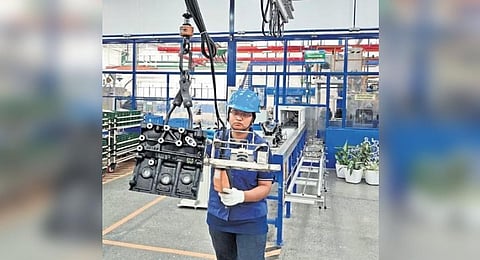

HOSUR: As the bell sound marking the end of the shift in module-I of Ashok Leyland’s Hosur plant petered out, almost all workers who stepped out of the plant were men as is usually the case with most manufacturing plants.
Things, however, were different in the new assembly line, module- II, located in the same plant, where an 80-member all-woman team assembles engines for Ashok Leyland’s light commercial vehicles like Dost and Bada Dost.
Aarthi, the 28-year-old engineer heading the maintenance unit of the assembly line, is ecstatic and couldn’t hide her smile. Starting her career at Leyland eight years ago, she worked at the Pantnagar facility in Uttarakhand and later at module-I of Hosur where she was the only woman in the maintenance department.
“I was not comfortable there. I had a lot of hesitation and I was conscious of my looks.” When asked what her apprehensions were, she said, “You got to be in my shoes to understand that,” hinting at our hardwired social mores and etiquette.
Ganesh Mani, president and chief of operations of Ashok Leyland, said the maintenance unit is being handled by a woman and a team working under her. Generally, these are considered male-centric functions and we made sure that changed. Women here are deployed across operations in production, maintenance and logistics at this automated engine assembly line, he said. Seven of them, including store managers and quality engineers, are in executive positions.
22% women workers in Leyland’s Hosur plant
The fully automated line can assemble one engine in 202 seconds and has the capacity to assemble 120 engines per day with a total installed capacity of 2.39 lakh per annum. The facility is crucial for the company’s strategy to grow its light commercial vehicle (LCV) business and manufacture alternative fuel-based vehicles, including electric light commercial vehicles, and be a top player in the CV business.
J Manisha, a 25-year-old working on the shop floor for the last five years, said the unit is suitable for women. “In the old module, the height of the rollers (conveyor) is taller, designed to suit the average height of men. Tools will be placed at a height and it will be difficult to access them. But the roller here is suitable for our height. Also, when we have female supervisors, it is easier for us to interact with them and share our problems.”
Ganesh Mani said the company is committed to gender diversity. “For the last 12 years, our Pantnagar facility has been training more than 700 women executives. Going forward, we want to speed up (diversity initiatives).”
Ashok Leyland’s Hosur plant has around 22% women workforce. Corporations are pushing gender diversity in the last few years to improve public perception and environmental sustainability and governance (ESG) ratings, among others. However, a lot needs to be done at the top. Of the 11 board of directors of Ashok Leyland, only one is a woman. Women are also missing in the top management of the company.